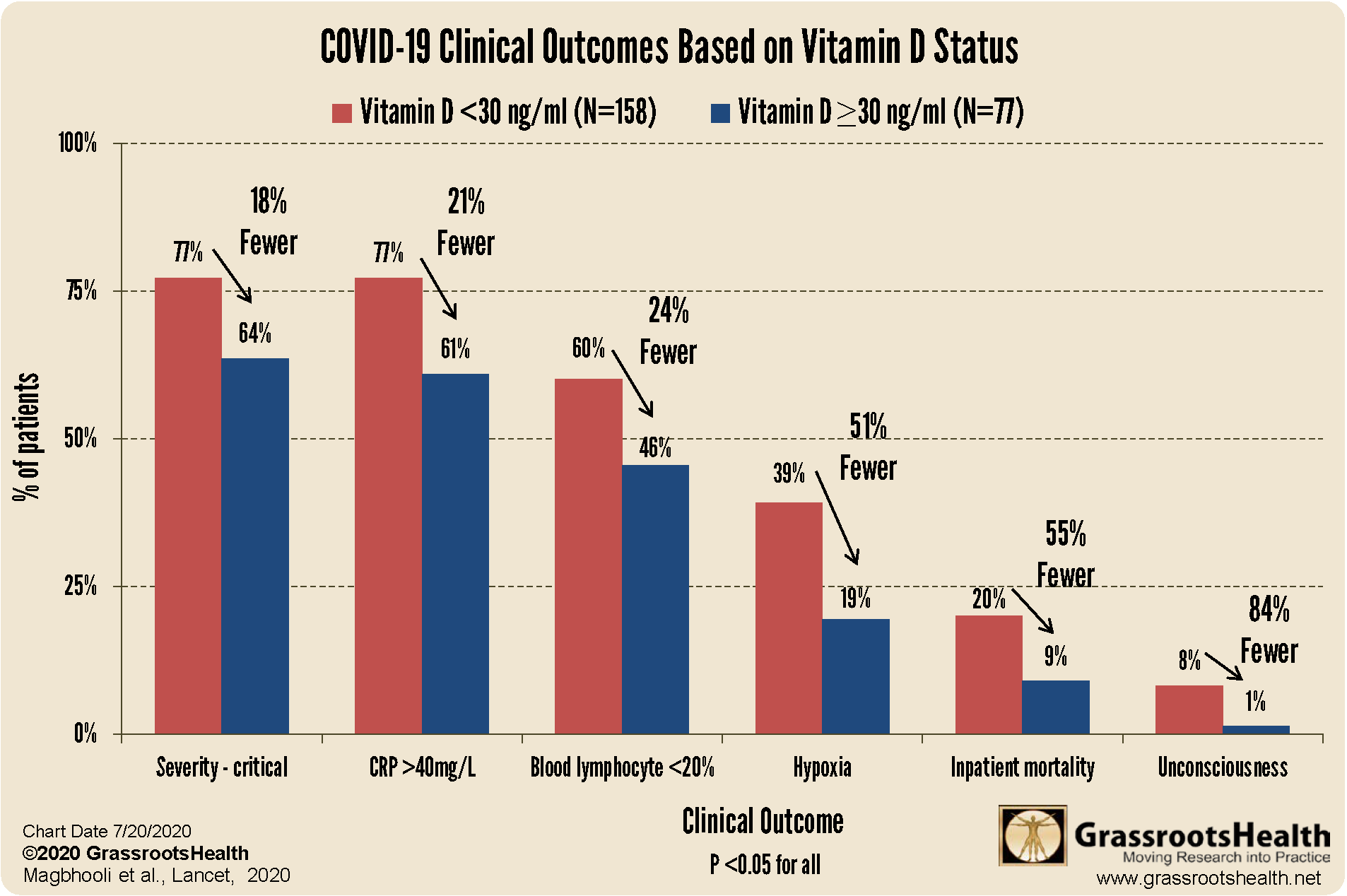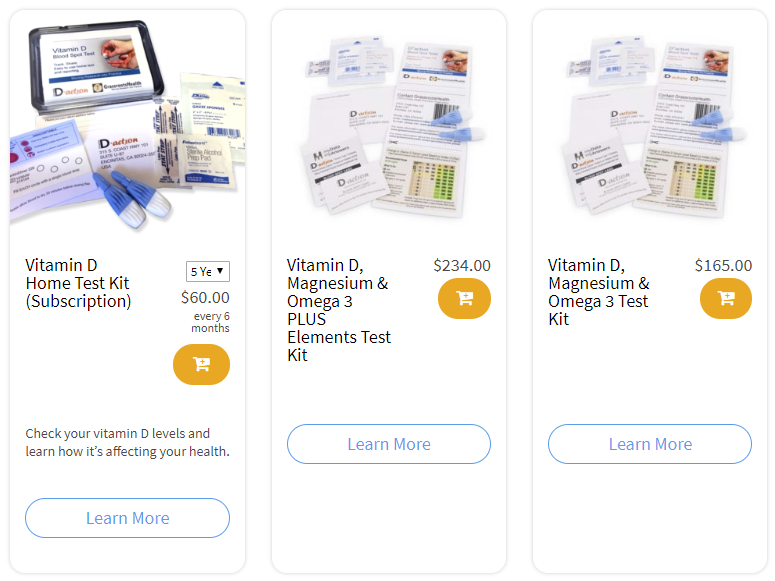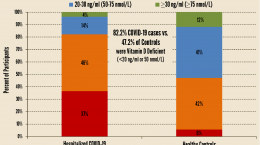Published on July 22, 2020
Vitamin D regulation is an integral component of a healthy immune system. Current evidence suggests that active vitamin D regulates immune activity in the lung and that its activity confers effective and lasting immunity to viruses of the upper respiratory tract such as COVID-19. In addition, vitamin D regulates inflammation and may potentially prevent or reduce the “cytokine storm” that is associated with the severity (pneumonia, acute respiratory failure and possibly death) of COVID-19. While there is not yet published randomized controlled trial (RCT) data demonstrating efficacy of vitamin D in COVID-19, data showing a protective effect of higher vitamin D levels continues to be published.
The study below provides observational data on the relationship between low vitamin D levels and more severe COVID-19.
Findings from the Sina Hospital in Tehran, Iran
 In a recently published study, Maghbooli et al. present the results from a study in which they analyzed hospital medical records from patients hospitalized with COVID-19 (part of their COVID-19 prospective patient registry). They found that vitamin D levels over 30 ng/ml (75 nmol/L) were associated with better clinical outcomes.
In a recently published study, Maghbooli et al. present the results from a study in which they analyzed hospital medical records from patients hospitalized with COVID-19 (part of their COVID-19 prospective patient registry). They found that vitamin D levels over 30 ng/ml (75 nmol/L) were associated with better clinical outcomes.
Of the 235 patients hospitalized with a diagnosis of COVID-19 and 25(OH)D measurement at the time of hospitalization:
- The average age of patients was 58.7 years
- 61% were male
- Average BMI was 27 (Overweight)
- The average length of stay in hospital was 6 days
- 19% were admitted to the Intensive Care Unit
- 73% were classified as severe-critical cases of COVID-19
- 14% died from complications of COVID-19
Comparison Based on Vitamin D Levels
The researchers used CDC criteria to classify COVID-19 severity as mild-moderate or severe-critical and compared them based on vitamin D levels. They also compared levels of inflammation, immune cell (lymphocyte) counts, lack of oxygen, unconsciousness and death.
The graph below shows clinical outcomes based on vitamin D status – a vitamin D level above 30 ng/ml (75 nmol/L) was associated with:
- Less severe COVID-19 and lower lymphocyte counts (marker of mild-moderate cases)
- Less acute inflammation (CRP) possibly resulting in reduced risk of “cytokine storm”
- 51% fewer cases of low blood oxygen (hypoxia) and 84% fewer cases of unconsciousness
- 55% fewer deaths
Vitamin D Levels Above 40 ng/ml Associated with Lower Mortality
The authors further analyzed the data based on vitamin D blood levels of at least 40 ng/ml (GrassrootsHealth’s Scientists’ Panel recommends a level between 40-60 ng/ml (100-150 nmol/L)). Although there were not enough patients for a full analysis based on this classification, they found that of those over 40 years old with vitamin D blood levels less than 30 ng/ml, 20% died from COVID-19, whereas in those with blood levels of at least 30 ng/ml, 9.7% died, and in those with vitamin D levels of at least 40 ng/ml, 6.3% died.
The study authors state that a blood level of at least 40 ng/ml may be optimal for vitamin D’s immunomodulatory effect. Do you know what your current vitamin D level is? Test today to find out!
Are You Getting Enough Vitamin D to Help Yourself?
We’re in a time of great crisis that could be greatly affected by making sure you and everyone you know has a serum level of at least 40 ng/ml. Help us help you.
Do you know what your vitamin D level is? Be sure to test today to find out, and take steps to keep it within a target of 40-60 ng/ml or 100-150 nmol/L! Give your immune system the nutrients it needs to support a healthy you and protect yourself from unnecessary diseases.
GrassrootsHealth Nutrient Research Institute is preparing to do a Community RCT with the use of our myData-myAnswers nutrient health system that over 15,000 people are already using for their health. We will demonstrate how one can use the Nutrient Research Model established by Dr. Robert Heaney to establish the effect of vitamin D serum levels of at least 40 ng/ml (100 nmol/L) on risk reduction with different ethnicities in the population. Please let us know if you’re interested in helping sponsor this project.
CLICK HERE for updates and new information about the project.
Through GrassrootsHealth Nutrient Research Institute, you can also test your essential elements magnesium, copper, zinc and selenium, toxins such as lead, mercury and cadmium, as well as your omega-3 levels, inflammation levels and thyroid stimulating hormone (TSH) level. Find out your levels today! Log on to the test selection page (click the link below) to get your tests and see for yourself if your levels can be improved.
Make sure you track your results before and after, about every 6 months!
Click Here to Access the Test Page
How can I track my nutrient intake and levels over time?
To help you track your supplement use and nutrient levels, GrassrootsHealth has created the Personal Health Nutrient Decision System called
For each specific supplement, you can track what days you take it, how much, and many other details. This will help you know your true supplemental intake and what patterns of use work for you to reach and maintain optimum nutrient levels. Check it out today!









